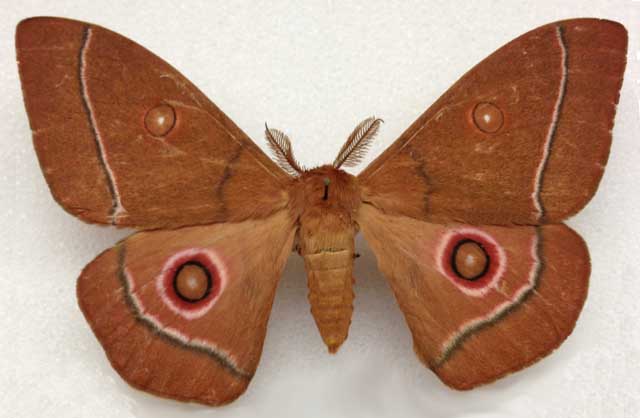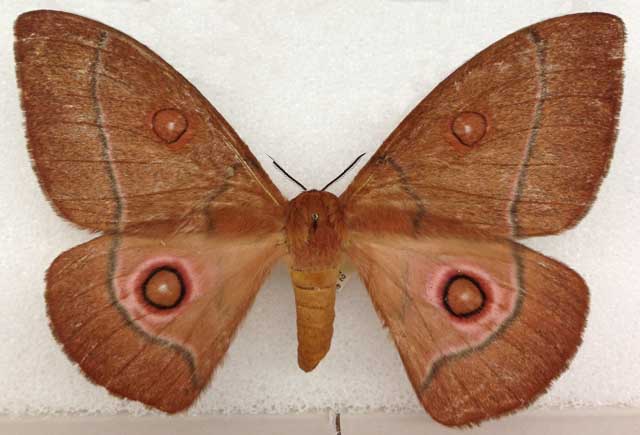Bunaeopsis thyene
|
|
Updated as per Bouyer's Catalog of African Saturniidae (BCAS: synonyms and incertae sedis), April 2007
|
Bunaeopsis thyene
bewe-nay-OPS-ihsMthigh-EE-neh
(Weymer, 1896) Antherea
This site has been created by
Bill Oehlke at oehlkew@islandtelecom.com
Comments, suggestions and/or additional information are welcomed by Bill.
| TAXONOMY:
Superfamily: Bombycoidea, Latreille, 1802
Family: Saturniidae, Boisduval, [1837] 1834
Subfamily: Saturniinae, Boisduval, [1837] 1834
Tribe: Bunaeini, Packard, 1902
Genus: Bunaeopsis, Bouvier, 1927
|
MIDI MUSIC
Wind Beneath My Wings
copyright C. Odenkirk
MIDI CITY
ON.OFF
<bgsound src="wings.mid" LOOP=FOREVER>
|
DISTRIBUTION:
Bunaeopsis thyene, (wingspan: ? mm) is found in
Cameroon: Barombi-Station; and possibly south to
Zambia: Mazabuka.
The following images from the Cornell University collection were identified as Bunaeopsis licharbas thyene. I do not know if that moth has
been synonymized with licharbas, remains a subspecies of licharbas or has been elevated to full species status. The male and female from Zambia seem to lack the
pinkish suffusions in the median area, and the forewing ocelli seem different from the other specimens listed as licharbas on the licharbas page.

Bunaeopsis licharbas thyene male, Mazabuka, Zambia,
Cornell University Collection, courtesy of Ryan Saint Laurent,
slight digital repair and tentative id by Bill Oehlke.

Bunaeopsis licharbas thyene female, Mazabuka, Zambia,
Cornell University Collection, courtesy of Ryan Saint Laurent,
digital repair and tentative id by Bill Oehlke.
Thierry Bouyer lists this moth
as "Incertae sedis" in his 1999 catalogue.
Incertae sedis means "of uncertain position (seat)". It is a phrase
used to define a taxonomic group where the broader
relationships are unknown or undefined.
Thus, Bunaeopsis thyene may be a distinct species,
but it might also be a synonym for other similar moths
going by a different name. More scientific study is needed to
determine the relationships.
FLIGHT TIMES AND PREFERRED FOOD PLANTS:
There is probably only one generation of
Bunaeopsis thyene per year with moths probably
on the wing in July.
ECLOSION, SCENTING AND MATING:
Males are
probably active at night and come in to lights.
EGGS, LARVAE AND PUPAE:
The life history is
unknown.
Mature larvae probably excavate subterranean chambers in which
the larvae pupate.
It is hoped that this alphabetical listing followed by the common
name of the foodplant will prove useful. The list is not exhaustive.
Experimenting with closely related foodplants is worthwhile.
Use your browser "Back" button to return to the previous page.
Go to Index for African Saturniidae
Go to Main Index for all Worldwide Saturniidae
The pronunciation of scientific names is
troublesome for many. The "suggestion" at the top of the page is merely
a suggestion. It is based on commonly accepted English pronunciation
of Greek names and/or some fairly well accepted "rules" for latinized
scientific names.
The suggested pronunciations, on this page and on other pages, are
primarily put forward to assist those who hear with internal
ears as they read.
There are many collectors from different countries whose
intonations and accents would be different.
The genus name Bunaeopsis, indicates a
similarity ('opsis' = looks like) to the Bunaea genus. That
name is from the Greek
and refers to a lobed hill-dweller.
The species name thyene probably comes form Greek mythology
where Thyene was one of the seven sisters of Hyas.

